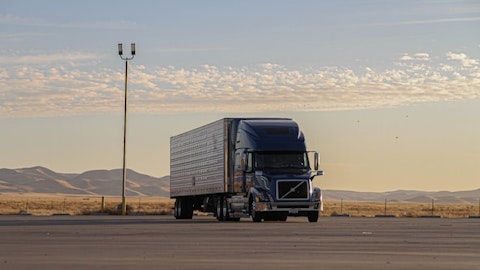Judy McReynolds : Well, I think our just, our strategic positioning is has put us in a place where we are. What’s interesting, is before maybe in a in a past situation, I’m thinking of consolidated freight ways. I think it was back in 2002, or something like that. Yeah, we were a primarily an LTL carrier, then and today, as a logistics company, there are opportunities that we feel comfortable saying yes to, and perhaps that businesses is good for ABF and it works well there. But also, we have a lot of other relationships. I think in our in our list, we have over 80 relationships. And we are working with them often and we know what works well where. And so being able to say yes, is bigger than just what works well in the asset base network, although that is a great opportunity for us right now, especially with where we were in the second quarter and the weakness in our regular core business, let’s just say, but lesson learned, I think, is to be sure that if you’re, if you’re saying yes, you can see your way to the profitability of that account and making sure that it works well for you.
I mean, I was thinking about your question. There have been times when we’ve had changes in the market, where we’ve taken on business, and thought, I’m thinking of some of examples with residential delivery type shipments, or other big volume players that, really what you’ve got to do is, is get involved with that business, see how it works, and make your decision to go forward with it rather than just saying yes to too much. And regretting that.
Jason Seidl: Appreciate the color, thanks a ton as always, yes.
Operator: Our next question is coming from the line of Jack Atkins with Stephens, please go ahead.
Jack Atkins: Okay, great. Thanks for taking the questions. And Matt, congrats on your new role. I guess — Judy, when you kind of think about the knock on effects and opportunities that may be available to you, from an investment perspective, over the next couple quarters with potential assets coming onto the market? Are there parts of the network where you see, maybe opportunities to accelerate investment? If you can maybe pick up an asset here or there in a particular, freight gateway city or something like that? Or how do you think about that, in terms of capital allocation here over the next, call it — let’s say, year?
Judy McReynolds : Yeah, Jack, I’m going to let Seth Runser take a shot at that, and then then come back to that.
Seth Runser: Okay, Jack, so we’re, yeah, Jack, we’re constantly looking at our network in terms of facilities. And we have a long-term real estate plan that we’ve discussed in the past, Judy mentioned some of the most recent things that have come online, like Phoenix, but we have a long-term plan. So, we have a view on all the properties of where we need additional capacity. And we’ll be opportunistic on any capital deployment there. From the equipment side, we continuously have invested in our fleet, we still have a lot of new tractors coming on this year. But same thing there will be opportunistic if we see opportunities in the upcoming quarter through the end of the year, if we need to either reduce the age of our fleet or flex our fleet up. So, we have a pretty good view on that.
Judy McReynolds : Okay, and we’re Jack, and we’re well connected with the real estate folks at all the competition. And that really helps us to see what opportunities that are there. But we had a good plan. But I think you always have to keep your ear to the ground and watch what happens. And this could be a unique opportunity. I agree.




